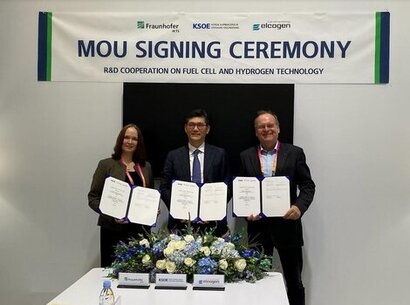
Elcogen will supply its solid oxide fuel cell (SOFC) and solid oxide electrolyser cell (SOEC) technology to the partnership. Elcogen’s technology offers an efficient solution to green hydrogen and emission-free energy production, thereby reducing commercial costs so customers can deliver affordable energy solutions to meet net-zero targets. The Company supplies the core technology that sits at the heart of energy security and transition away from fossil fuels.
“Our emission-free power generation and green hydrogen production technology has the potential to make an important contribution to the decarbonisation of energy industry” said Enn Õunpuu, CEO of Elcogen. “Today’s agreement with KSOE and IKTS shows that world class shipbuilding and system integrators share that view. We are delighted to be working with two such high quality partners and are looking forward to our collaboration.”
Dr. Sung-Joon Kim, Chief Technical Officer at KSOE added that the collaboration between KSOE, Fraunhofer IKTS, and Elcogen has high value at a time when the shipbuilding and offshore industries are now moving into a zero CO2 era.
"Today we are taking the meaningful step towards a successful and outstanding collaboration for all of us, and ultimately an important step for global society” said Professor Alexander Michaelis, Director of Fraunhofer IKTS, describing the scope of the MOU. “Renewable energies and carbon net zero are the challenge of our time, and in this cooperation, we can apply our many years of experience, particularly in the field of solid oxide fuel cells.”
KSOE is a research-oriented intermediate holding company of Hyundai Heavy Industry (HHI) group, one of the world's largest shipbuilders and is headquartered in Seoul, South Korea. In its own research centres, KSOE is pursuing the development of innovative technologies, including emission-free power generation and hydrogen value chain.
IKTS is a world leading application-oriented research institute in the ceramic sector. IKTS has been developing various fuel cell stack designs, has constructed them as prototypes and tested them for their suitability for different applications including load profiles. Together with its partners, Fraunhofer IKTS develops stacks for use in decentralised energy supply systems – from micro-CHP units to systems with more than 20 kW power. To this end, IKTS selects and tests various components within the stack environment, including long-term and cycle tests, and develops cost-efficient and automatable manufacturing processes for stack production.
For additional information:

